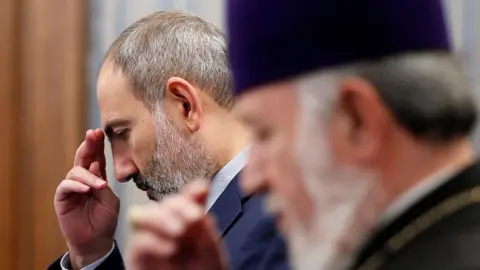In a dramatic escalation within Armenia’s political landscape, Prime Minister Nikol Pashinyan has leveled serious accusations against a prominent figure within the Armenia Apostolic Church (AAC). Specifically, Pashinyan has openly suggested that Catholicos Karekin II, the supreme leader of the Church, has breached his vows of celibacy by allegedly fathering a child. This shocking allegation marks a significant departure from Pashinyan’s earlier promise to abstain from meddling in the Church’s affairs, highlighting a deepening rift between the Armenian government and its religious institution.
The confrontation began with Pashinyan’s direct rebuke to the unnamed clergyman, urging him to “go fool around with your uncle’s wife” in a statement that has reverberated through Armenian society. The Prime Minister’s harsh rhetoric underscores the increasingly adversarial relationship between the liberal government and the deeply conservative AAC. The accusations come at a time when tensions in Armenian society are already high, further straining a relationship that has seen both the government and Church previously coexisting despite their ideological differences.
Armenia has a unique historical context with Christianity, having been the first nation to establish it as a state religion in 301 AD. The AAC, while enjoying a familiar national status, operates under a legal separation of Church and state. However, Pashinyan’s recent public allegations are seen as a defiance of this established convention, threatening not only the Church’s authority but also the government’s stability, especially in light of upcoming elections in 2026.
The repercussions are expected to extend beyond domestic politics. The allegations against Karekin II could jeopardize peace discussions, particularly following Armenia’s recent military setbacks in the region against Azerbaijan. Establishing peaceful negotiations with Azerbaijan is crucial for the stability of the South Caucasus, and the Church’s involvement in public discourse could complicate the government’s diplomatic efforts. This potential for diplomatic fallout adds an additional layer of complexity to an already charged situation.
The Church itself has remained relatively silent amidst the controversy but has accused the government of attempting to silence its voice. Pashinyan’s allegations put pressure on Karekin II’s position, as Church regulations dictate that only celibate monks can serve as Catholicos. Despite the absence of publicly presented evidence, Pashinyan has boldly threatened to release purported evidence that he claims substantiates his allegations, indicating the degree to which this scandal could affect political dynamics in Armenia.
Critics of Pashinyan, including former presidents Levon Ter-Petrossian and Serzh Sargsyan, have rallied around the Church, framing the Prime Minister’s actions as an attack on the spiritual leadership of the country. Political animosities have only intensified since the conclusion of the 2020 war with Azerbaijan, when the Church began to adopt an increasingly critical stance toward the government. Karekin II’s demand for the rights of Armenians displaced from Nagorno-Karabakh signifies further alignment of the Church with the opposition.
Moreover, the ongoing allegations against Karekin II tap into deeper historical grievances and controversies involving the Church’s influence and governance. Past criticisms from the Armenian Patriarch of Jerusalem regarding the spiritual integrity of Karekin II still linger, raising questions about the Church’s management and its perceived shift from spiritual guidance to material concerns.
The complexities of this situation present potential implications not just for the future of Armenia’s political landscape but also for its societal cohesion as polarization deepens. The contention between Azerbaijan and Armenia, pressures from diaspora communities, and growing internal dissent against the government compound the ongoing crisis of confidence within the Armenian state.
As the political theater unfolds, the ramifications of Pashinyan’s explosive allegations could be profound, fundamentally altering the dynamics between Holy See and state governance in Armenia. The Prime Minister has stated, “We returned the state to the people. Now we must return the Church to the people,” a sentiment reflecting the government’s attempt to assert control amidst rising backlash. As opposition figures mobilize, and the Church potentially emerges as a focal point for both political dissent and spiritual unity, the future trajectory of Armenia’s governance and its societal fabric remains uncertain.



